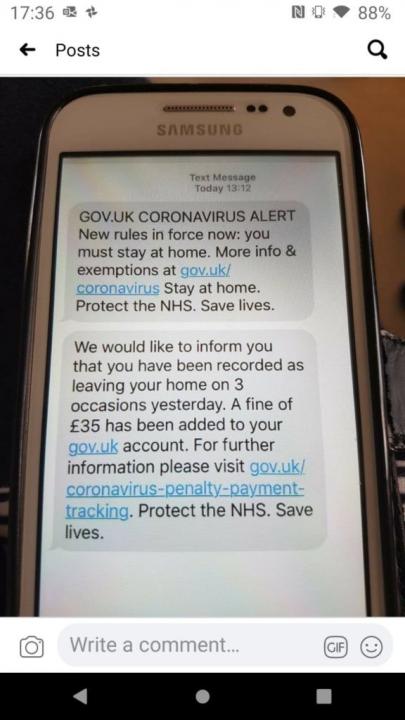
Written by cybersecurity and online safety expert, Wayne Denner
While amazing people right across the world, including our NHS Heroes, are trying to deal with and stop the spread of Covid-19, it has also become an opportunity for unscrupulous scammers and cyber criminals to exploit unsuspecting victims. Over the past week we reported a Covid-19 ‘pandemic map scam’ which was doing the rounds. But it seems the scammers have been increasing their efforts.
So, let’s not let the scammers have it too easy. Here are our Top 5 Scam Round ups to be on the lookout for this month.
1: Bogus Text (SMS) Messages
We’ve had reports of a number of different types of messages in circulation purporting to be from the UK Government. Text tell the recipient ‘You have been out of your house 3 times today, you are in breach of government guidelines. Your £30 fine will automatically be added to your bill. If you get this, Ignore it.

Image Credit: Twitter @tamcohen
The reason this message is sometimes perceived as genuine is the fact that earlier this week the UK Government did in fact send one real and genuine message to all mobile phone users with the latest advice relating to the Covid-19 pandemic.
2: HMRC Scams
A number of scam text messages and emails have been circulating, purporting to be from HMRC offering the self-employed and freelancers rebates e.g. along the lines of ‘you are eligible to get a tax refund (rebate) of XXX’ with a link saying ‘Access your funds now’. The advice from HMRC is that you should not reply to the email or SMS or open any links in the message. HMRC will never send email or text (SMS) notifications about tax refunds of rebates and you can also contact HMRC official website if you’re not sure about something which you have received.

3: Invoice Paid or Invoice Problem
With more employees than ever before now working from home due to the Coronavirus – it’s important for staff to remain vigilant on any emails they receive. Particularly those with the subject line ‘Invoice Paid’ or ‘Invoice Issue’. Scammers have been ramping up their phishing efforts – keep an eye out for suspicious emails especially those which contain PDF attachments these can often be claiming to be an invoice paid, locked pdf asking you to enter a user name and password to unlock.
These PDFs can be carrying malware or links for phishing websites. This can also include trojans or ransomware – caution should always be taken when you receive any unsolicited email with a PDF attachment. The following is always useful to keep in mind.
RELATED: Scammers are using coronavirus fears to access your data
4: WhatsApp Scam
Over the past number of years all social media and messaging platforms have seen their fair share of scams and hoaxes. One to be on the lookout for at the moment is on popular messaging app WhatsApp. The not so new scam called ‘WhatsApp Gold’ started off in 2011 and has been resurrected again during the COVID 19 Pandemic. It claims to provide access to secret versions of WhatsApp, offering users a version of WhatsApp claiming to be from celebrities. Of course, no such secret app or gold version exists. Or does it? :) No. It does not.
The message which users receive includes a link to download the app but what they download instead is a form of malware which infects the users’ device, privacy becomes compromised and the result is the theft of sensitive data.
5: Fake Advertisements for Face Masks or Sanitising gel
With more and more people staying at home and opting to shop online, it’s important to remain vigilant for fake advertisements and websites which can pop up across social media and the internet.
Often they will ask buyers to pay via money order or PayPal by using the ‘Send money to family and friends’ feature – when sending a payment this way users don’t have PayPal buyer protection.
Once the payment has been sent you will not see your money again. So only use trusted websites, always buy from within the platform and the same goes when making the payment and use your credit cards such as PayPal Buyer Protection which provides a safe experience for the buyer.
Take care online. And in our strange new world.
RELATED: Tech Craic: Acronis' Candid Wueest - Cybersecurity and Coronavirus
Find out more about Wayne and his top cybersecurity tips here.